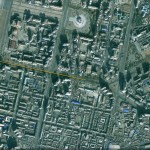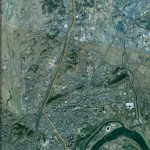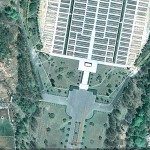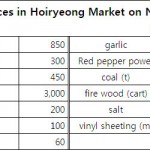Leaked version of the report here (PDF). Thanks to a reader who apparently got it from Arms Control Wonk.
Information on the report below:
UPDATE 2 (11/10/2010): According ot the Washington Post:
The U.N. Security Council was preparing Tuesday to release a long-delayed report alleging that North Korea may have transferred ballistic-missile and nuclear technology to Syria, Iran and Burma, according to diplomats.
The 75-page report, whose release has been blocked for six months by China, an ally of Pyongyang, reinforces U.S. claims that North Korea has emerged as a key supplier of banned weapons materials to Washington’s greatest rivals.
A copy of the report was seen by The Washington Post.
The findings are based on interviews with several foreign governments, U.N. nuclear inspectors and news media reports.
Those accounts, according to the U.N. report, indicate North Korean “involvement in nuclear ballistic missile related activities in certain other countries, including Iran, Syria and Myanmar,” Burma’s official name.
Nonproliferation experts have been concerned about North Korea for years. In his new memoir, “Decision Points,” former president George W. Bush reveals that, in 2007, U.S. intelligence determined that Syria had built a nuclear reactor with North Korean help. (Israeli jets destroyed the reactor, after then-Prime Minister Ehud Olmert’s request that the United States bomb the facility was rebuffed, Bush recounts, adding that Olmert “hadn’t asked for a green light.”)
In addition to voicing alarm over the reactor in Syria, the seven-member panel that produced the U.N. report said it was investigating “suspicious activity” by a sanctioned North Korean firm in Burma, as well as reports that Japan had arrested three individuals last year for “attempting to illegally export a magnetometer to Myanmar.”
A magnetometer – which has civilian and military uses – is one of numerous items that can be used in the production of a ring magnet, a component in a centrifuge. It can also be used in a missile guidance system.
An earlier version of the U.N. panel report’s findings was reported by the blog Arms Control Wonk. But David Albright, a nuclear weapons expert, said the report’s formal release will be important because it places a U.N. imprimatur on allegations by Western intelligence agencies and independent experts.
“It’s significant that they are saying it,” Albright said.
The earlier move by China to block the report underscores the country’s increasing efforts to prevent the Security Council from vigorously enforcing a broad range of global sanctions that have targeted key Chinese allies, and in some cases, turned up awkward evidence of Chinese arms in some of the world’s most deadly conflict zones. China recently sought to block the release of another U.N. panel report showing that Chinese ammunition has found its way into Darfur, in violation of U.N. sanctions.
Its decision to lift the hold on the report comes two days before President Obama is due to meet Chinese President Hu Jintao in Seoul, where the two leaders are attending a summit of the Group of 20 major economies. The United States has been the strongest proponent of imposing tough U.N. sanctions against North Korea in an effort to persuade the hermetic communist regime to curtail its nuclear ambitions.
China’s press spokesman, Yutong Liu, did not respond to a request for comment.
The Security Council expanded U.N. sanctions against North Korea last year and revived a moribund sanctions panel to ensure the enforcement of measures aimed at curbing North Korean trade in nuclear and ballistic-missile technology. China supported the resolution’s adoption, but it has voiced concern privately over the public disclosure of highly sensitive findings.
UPDATE 1 (11/9/2010): According to Reuters:
After months in limbo due to Chinese objections, a U.N. report suggesting North Korea may have supplied Syria, Iran and Myanmar with banned nuclear technology is heading to the Security Council.
The latest report by the so-called Panel of Experts on Pyongyang’s compliance with U.N. sanctions was delivered to the Security Council’s North Korea sanctions committee in May.
Normally such a report would be reviewed and passed to the council for consideration of possible action. But the report on North Korea did not move for nearly six months due to Chinese objections and its fate was unclear until Friday, council diplomats told Reuters on Monday.
The North Korea report should be published on the sanction committee’s website as early as Tuesday, they said.
The attempt to prevent the report’s transfer to the Security Council and release to the public, envoys said, was emblematic of China’s increasingly self-confident approach to international diplomacy as it seeks to protect states like North Korea and Sudan to which it has close ties.
Reuters reported in May that the report said there was reason to suspect North Korea — under U.N. sanctions for testing nuclear devices in 2006 and 2009 — has become a proliferator of banned technology.
The 75-page document, obtained by Reuters, said the panel was concerned about reports of “continuing DPRK (North Korea) involvement in nuclear and ballistic missile related activities in certain countries including Iran, Syria and Myanmar.”
Last week, China chose to keep silent when the sanctions committee asked its members — the 15 nations on the Security Council — if they had any objections to the report. That allowed it to formally move to the council.
“China has suddenly decided to allow this very damning report to go to the Security Council,” one diplomat said on condition of anonymity. “I think Syria and Myanmar were happy the Chinese were blocking it. Now China has other priorities.”
But China is unlikely to allow the report to be used for further sanctions against Pyongyang, envoys said.
CHINESE FURY
China’s other priorities, diplomats said, include blocking a similar report by another U.N. panel of experts on compliance with an arms embargo for Sudan’s conflict-torn western Darfur region. That report, unlike the one on North Korea, directly implicates China by raising concerns that Chinese firms may have been violating the Darfur arms embargo.
The Sudan report has infuriated China, which for weeks has prevented the Sudan sanctions committee from passing it to the Security Council to consider the panel’s recommendations.
Sanctions committees work on the basis of consensus, which means each member has a virtual veto.
In its report, the Sudan expert panel said Chinese bullets were found at the site of attacks against U.N.-African Union peacekeepers in Darfur, although it did not suggest the government was in any way responsible.
It is unclear when and if the Sudan report will be published.
Diplomats said they had feared China was trying to put the brakes on activities of all Security Council sanctions committees overseeing compliance with U.N. measures imposed on states China is friendly with, like Sudan and Iran.
“Maybe China has decided not to block all sanctions reports and they’ve got to have some give and take,” a diplomat said.
While China has allowed the council to impose sanctions on Iran and North Korea, it has refused to expand the 2005 arms embargo in Sudan and joined Russia in vetoing a 2008 attempt by Britain and the United States to sanction Zimbabwe’s leaders.
It has also blocked all attempts to sanction Myanmar, a country the United States and Britain have suggested deserves to be sanctioned for human rights abuses.
U.N. Secretary-General Ban Ki-moon said Myanmar’s first election in 20 years on Sunday was “insufficiently inclusive, participatory and transparent.”
ORIGINAL POST (10/28/2010): (Thanks to a reader) Here is the final report of the “Panel of Experts” to the UN Security Council pursuant to Resolution 1874.
I post the executive summary followed by a link to the PDF of the entire report.
Executive Summary:
1. On 12 June 2009, the Security Council unanimously adopted resolution 1874 (2009) in which it requested the Secretary-General to establish a Panel of Experts mandated to: gather, examine and analyze information regarding the implementation of the measures imposed by the Council in resolutions 1718 (2006) and 1874 (2009), in particular incidents of non-compliance; make recommendations on actions the Council, the Committee or Member States may consider to improve implementation of those measures; and, assist the 1718 Committee in carrying out its functions.
2. The measures imposed by resolution 1718 (2006) and strengthened by resolution 1874 (2009) include: (a) a ban on the provision to and the procurement from DPRK of nuclear-related, other weapons of mass destruction-related and ballistic missile-related items as well as all arms and related materiel, except for small arms and light weapons and their related materiel provided to the DPRK; (b) a ban on the transfer to or from the DPRK of services and assistance related to the provision, manufacture, maintenance or use of the proscribed items; and (c) a ban on the provision of luxury goods to the DPRK.
3. Resolution 1874 (2009) also introduced a strong interdiction system, which calls upon all Member States to inspect all cargo to and from the DPRK in their territory and to inspect vessels with the consent of the flag State on the high seas, if the Member State concerned has information that provides reasonable grounds to believe the cargo contains proscribed items. A Member State discovering such items is required to seize and dispose of them. The inspecting Member State is also required to submit a detailed report on such cases to the 1718 Committee.
4. No official allegations have been presented to the Committee since the adoption of resolution 1718 (2006) concerning the provision of proscribed nuclear-related or ballistic missile-related items, technology or know-how to or from the DPRK. Nevertheless, the Panel of Experts has reviewed several government assessments, IAEA reports, research papers and media reports indicating continuing DPRK involvement in nuclear and ballistic missile related activities in certain countries including Iran, Syria and Myanmar. The Panel of Experts believes that special attention should be given by all Member States to inhibit such activities. Further study of these suspected activities by the DPRK should be conducted for a more thorough understanding of the facts.
5. The 1718 Committee has been notified, since the adoption of resolution 1874 (2009), of four non-compliance cases involving arms exports. An analysis of these cases indicates that the DPRK continues to engage in exporting such proscribed items. In these cases, the DPRK has used a number of masking techniques in order to circumvent the Security Council measures, including false description and mislabeling of the content of the containers, falsification of the manifest covering the shipment, alteration and falsification of the information concerning the original consignor and ultimate consignee, and use of multiple layers of intermediaries, shell companies, and financial institutions. The Panel of Experts recommends in this regard that extra vigilance be exercised in accordance with local norms at the first overseas maritime port handling such DPRK shipments or transshipments with regard to containers carrying cargo originating from the DPRK. The Panel also recommends that consideration be given to introducing procedures that, without overburdening international maritime commerce, would assure that onward transshipment ports are aware of the cargo’s DPRK origin so that they could also apply extra vigilance.
6. The Panel of Experts also notes that air cargo poses certain other issues and vulnerabilities. Difficulties involved in the inspection of cargo in an aircraft in transit and inability to subject direct flights to inspection leaves in place important vulnerabilities with respect to the implementation of the resolutions. The Panel recommends that consideration be given by Member States over whose territory such aircraft may fly, stop or transit, that efforts be undertaken in those cases to closely monitor air traffic to and from Sunan and other DPRK airports, and that cargoes to and from the DPRK be declared before over flight clearance is provided.
7. The Committee has also received two reports of seizure of luxury goods. There was a clear understanding in both of these cases that the goods involved were proscribed luxury items. However, such understanding is not always present. Most national implementation reports omit any mention of luxury goods. National definitions of luxury goods vary and associated national export controls are implemented in an uneven manner, which risks undercutting the effectiveness of this measure vis-à-vis the DPRK. To close these potential gaps, the Panel of Experts proposes in this report basic principles and important factors that should be considered in designating luxury goods.
8.The DPRK also employs a broad range of techniques to mask its financial transactions, including the use of overseas entities, shell companies, informal transfer mechanisms, cash couriers and barter arrangements. However, it must still, in most cases, rely on access to the international financial system to complete its financial operations. In structuring these transactions, attempts are made to mix illicit transactions with otherwise legitimate business activities in such a way as to hide the illicit activity. Therefore, the Panel of Experts underscores the importance of exercising extra vigilance to assure that financial transactions and services do not contribute to the DPRK’s proscribed activities. Special attention is drawn, in this regard, to non proliferation and anti-money laundering and combating the financing of terrorism (AML/CFT) principles and guidelines published by the Financial Action Task Force (FATF) and to FATF’s Typologies Report on Proliferation Financing.
9. The Committee has designated eight entities and five individuals for financial (and travel in the case of individuals) sanctions. These few designations seriously understate the number of known entities and individuals engaged in proscribed activities, and are inadequate to the task of effectively inhibiting key DPRK parties from engaging in proscribed activities. No account has yet been made also to deal with those substituting for or acting for or on behalf of these entities and individuals. Thus, all Member States should be invited to provide to the Committee for its consideration the names of entities and individuals who are believed to be engaged in proscribed activities, and especially those that have been implicated in non-compliance cases reported to the Committee. Consideration should also be given to making sure that those entities and individuals that are already designated are not able to avoid the Security Council measures through the use of aliases.
10. Special attention is drawn also to the fact that a substantial number of Member States have not yet filed the national implementation reports called for in the resolutions. These reports are essential to an overall evaluation of the steps being taken to implement the Security Council measures and to ensure they are implemented effectively.
Here is a link to the full report (PDF).
The report is full of data and I have added it to my Economic Statistics Page (with many other great sources of data). You can see them all here.




